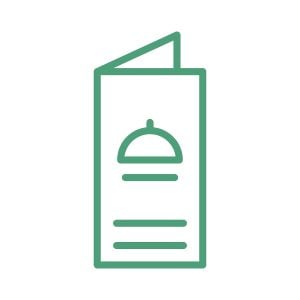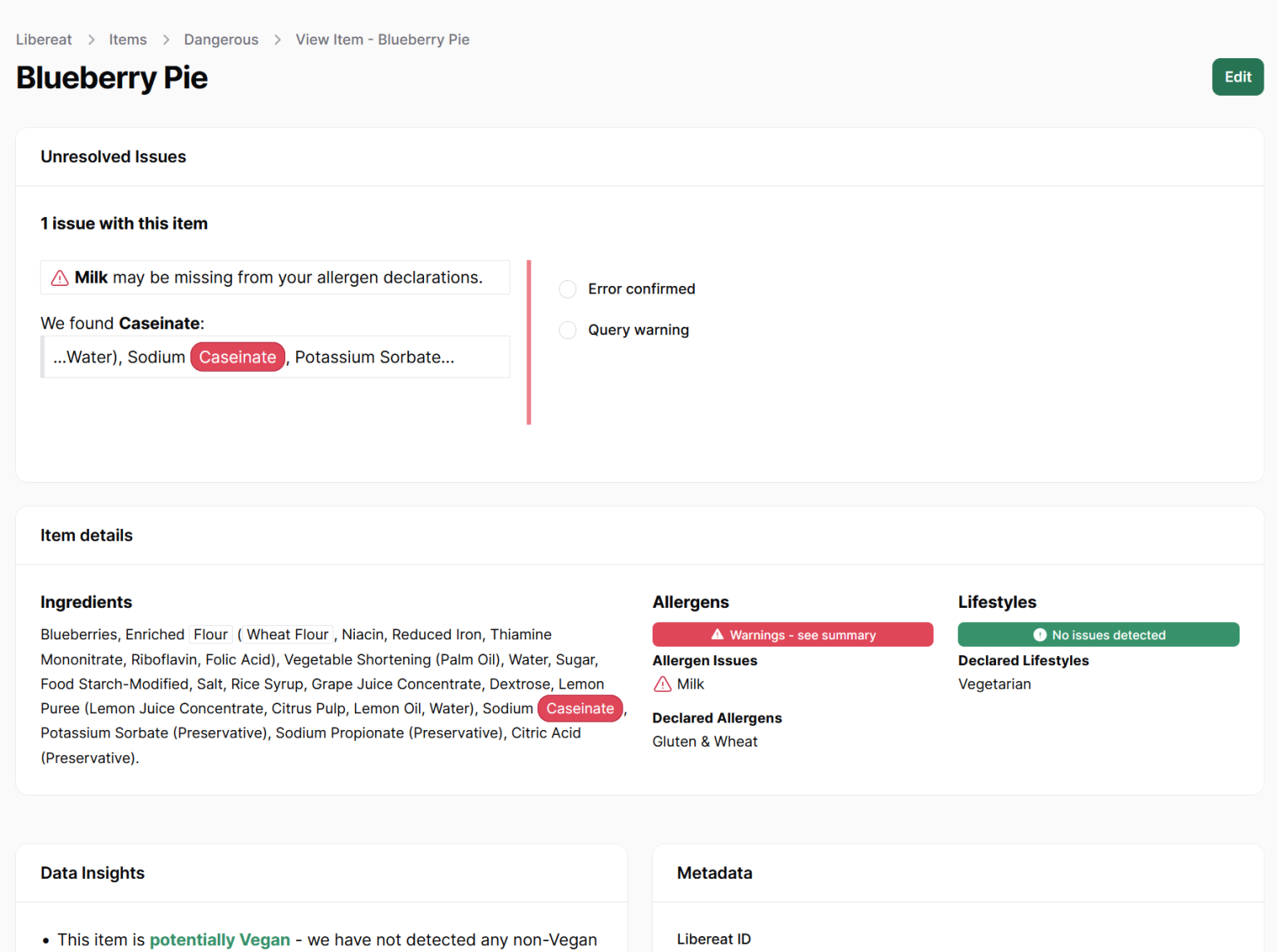Frequently Asked Questions
Hello, welcome to our Frequently Asked Questions. Here, we explain more about how LiberEat technology, how it works and who it helps as well as important terms and legislation relating to food safety, we’ve answered some commonly asked questions below.
If you have a specific question for us or would like to learn more about our unique allergen and error detection technology, drop us a line.

Common Food Safety Questions
A food recall occurs when food available to purchase is deemed unsafe and removed from the supply chain by the food manufacturer or distributor due to mislabeling.
Errors can occur on labels because of undeclared ingredients (including allergens), providing wrong shelf-life, and wrong or lack of storage instructions also pose significant health consequences to consumers. Recalls can also be recalled due to a health or safety hazard, such as pathogen contamination.
When a recall occurs, consumers are advised to take appropriate action, such as returning the product to the store it was purchased from or disposing of it.
For example, if a product claims to be vegan but is then found to contain milk – it would need to be recalled. According to the FSA recall alerts, undeclared milk is one of the most common reasons for recall. Similarly, if the product is found to contain peanuts but doesn’t declare this on the label – an allergen recall would ensue.
Food recalls are announced to the public via the FSA and relevant charities such as the Anaphylaxis Campaign or The Vegan Society.
A food withdrawal is slightly different to a food recall, as outlined above, and occurs when a food manufacturer or distributor removes a product from the supply chain before it reaches the market and, therefore, before the product reaches the consumer. Unlike recalls, food withdrawals don’t need to be announced publicly via the FSA because the error or issue has been caught before the public is in immediate danger.
The Food Standards Agency (FSA) in England and Wales offers guidance and support to businesses to assist in correctly completing the withdrawal or recall process. This falls into the remit of Food Standards Scotland, north of the border. If foods that are unsafe or don’t meet legal requirements have reached consumers, the FSA will work alongside the business to identify supplier issues and initiate a food recall notice.
On the FSA website you can see all food recalls, including allergen recalls, that have occurred.

Allergens & Labelling Requirements
A food allergen is a substance in food that causes an adverse reaction in some people due to an immune system response. Common food allergens are known as the ‘14 Major Allergens’ in the UK and include tree nuts, peanuts, milk, eggs, soy, gluten, fish, molluscs, crustaceans, gluten, celery, mustard, lupin and sulphites.
All businesses in the UK that sell or provide food directly to the consumer must declare the presence of the 14 major allergens. This includes restaurants, cafes, takeaways, catering businesses, and food manufacturers.
Examples of allergen declarations include providing information on a clearly visible menu, chalkboard or information pack. For food sold online through what’s known as ‘distance selling’ – such as takeaway restaurants – allergen information must be available before purchase, such as on a website, menu, or conveyed over the phone. When the food is delivered, the information must again be made available either orally or in writing, such as using labelling or providing a menu. Many takeaway outlets use a sticker, for example, to indicate something as ‘gluten free’.
Food that is packaged before purchase and sold in the same venue, known as PPDS (Prepacked for Direct Sale) foods, are legally required to provide allergen labelling, containing a full ingredients list with any of the major allergens emphasised in bold or in a different colour.
There is no legal requirement to label vegan or vegetarian products, though it is considered good practice to do so – and it makes it easier for consumers to find products suitable for them. Various organisations such as The Vegan Society and Vegetarian Society allow businesses to undergo a certification process to use their trademark on approved products, indicating that the food meets their standards as a vegan or vegetarian. It is common for menus to use the abbreviations ‘V and ‘VG’ to indicate if food is vegetarian or vegan, respectively. Our article on the subject gives an in-depth explanation of the value of vegan/vegetarian labels and ones commonly used in the industry.
Clear and accurate vegan and vegetarian labelling is important for supporting consumer choice, promoting food safety, and providing transparency about the products they purchase.
Many members of the public avoid animal products for ethical, health, or environmental reasons, and clear labelling allows consumers to make informed decisions about what they are ingesting. Some consumers opt for vegan products due to milk allergies and intolerances, which is another good reason for clarity on the product.
If you work in a restaurant or have a food allergy, you’ll be familiar with receiving this big ringbinder of information in some cases.
Overall, an allergen menu lists the ingredients of dishes sold at a restaurant and highlights those which contain one or more of the 14 major allergens. Its purpose is to provide information to customers with food allergies so they can make informed decisions about what they can or cannot safely eat. Allergen menus must be clear, up-to-date, and easily accessible to customers. It is also important for restaurants to have detailed allergen training (and training refreshers) for their staff, so they can assist customers with allergen-related questions and help prevent allergen cross-contamination during food preparation in the kitchen.
LiberEat was founded in 2016 by Barry Leaper. Barry’s passion for ‘Making food safer for everyone’ started due to his wife and mother’s dietary requirements and gluten allergies (Coeliac disease). As a result, we were made aware of the difficulty food allergies can cause when shopping and dining in restaurants and developed the mission to create a new method of food safety to keep both businesses and consumers safe using cutting-edge, unique technology.
LiberEat is a data technology business that provides an allergen and error detection SaaS technology offering to Food Safety and Quality Assurance leaders at restaurant chains, caterers, food producers/manufacturers, and supermarkets.
At an extremely precise level, our technology identifies allergens and commonly avoided ingredients in a wide range of food data and acts as a safety blanket or a second line of defence for food businesses. We catch manual errors in data to protect businesses and the consumers they serve – ‘Making food safer for everyone’
To get in touch with the LiberEat team, please use our ‘Contact Us’ or ‘Business Enquiries‘ page located on our website. If you are interested in keeping updated with our news and updates, you can follow us on LinkedIn or Twitter.
LiberEat supports businesses in the food industry (specifically in Food Safety and Quality Assurance teams) by detecting any errors in allergen or ingredient data present on their food labels, websites and menus before they reach the consumer. This helps businesses to avoid potential legal or reputational damage while also keeping consumers safe. Our goal is to protect consumers who avoid ingredients whether they have food allergies, intolerances or are following a vegan and vegetarian diet.
LiberEat’s mission is to make food safer for everyone – protecting those with dietary requirements and supporting food businesses by detecting and therefore reducing allergen errors in communication with consumers.
By helping businesses clearly communicate allergen information in their products, consumers with allergies can stay safe when shopping and dining out – and can make informed choices about which products they purchase. The impact of this is huge since getting allergen information wrong can be fatal for consumers with allergies.
The most common allergen detection method currently used by companies is human manual checks or working with data that – at some point – has been input by humans.
With the best will in the world with continuous training and development of food safety teams, human error can still occur when checking through large amounts of supplier data. We often see these manual errors slip through the cracks leading to food recalls or, worse, injury to consumers.
The benefit of LiberEat’s technology is that it can work alongside existing checking methods and software systems as a second layer of safety checks and risk reduction, catching any data errors that may have been initially missed.
LiberEat technology results from four years of research and development in training algorithms to detect all kinds of errors within food data and lots of work from our talented developer team (including Machine Learning engineers). The development of LiberEat’s technology was enhanced thanks to our unique relationships in the food industry and collaborations with universities and academics.
As a result, LiberEat significantly outperforms current industry methods to ensure the accuracy of your data that reaches consumers on food labels or menus. The technology has consistently identified live menu errors and labelling data that existing processes missed.
As most food safety leaders will tell you, having allergen detection procedures in place are essential to help your business avoid risk to consumers along with reputational and legal damage. It is a legal requirement in the UK to label any of the major allergens that may be in your food.
Failure to meet allergen labelling requirements may result in up to an unlimited fine from local authorities and potentially even jail time. You can learn more about UK Food Safety Laws in our detailed guide on this topic.
Beyond utilising the LiberEat food safety platform, which detects and alerts you to allergens, errors and risks, the Food Standards Agency has various tools to help familiarise your business with food allergen safety procedures. There is an online training course on their website that details how to provide allergen information for prepacked and non-prepacked foods, as well as how to manage allergens in different work environments. If you’re unsure what labelling requirements are required for your business, the FSA has also developed a labelling tool to help identify what allergen information requirements your business will need to follow.
LiberEat also has useful information regarding food safety, such as our article detailing what to expect from environmental health visits and tips on developing a HACCP plan for your business.
Contact us To Learn More
If you are a food safety or quality assurance professional working with food data and you want to protect your business and consumers from errors, recalls, and withdrawals – speak to us today about our cutting-edge technology, which detects allergens and any errors that may slip through the cracks in manual data entry and checking. It’s the easiest way to bolster your food safety practices.

Enhance Allergen Safety with LiberEat
LiberEat’s Allergen Error Detection Technology Platform provides unmatched accuracy in detecting allergen errors that often go unnoticed by manual checks.
Our cutting-edge software integrates seamlessly with your current food safety systems, thoroughly scanning and analysing your menu, product and supplier data to pinpoint potential allergen issues and detect these so they can be rectified before they reach a consumer.
